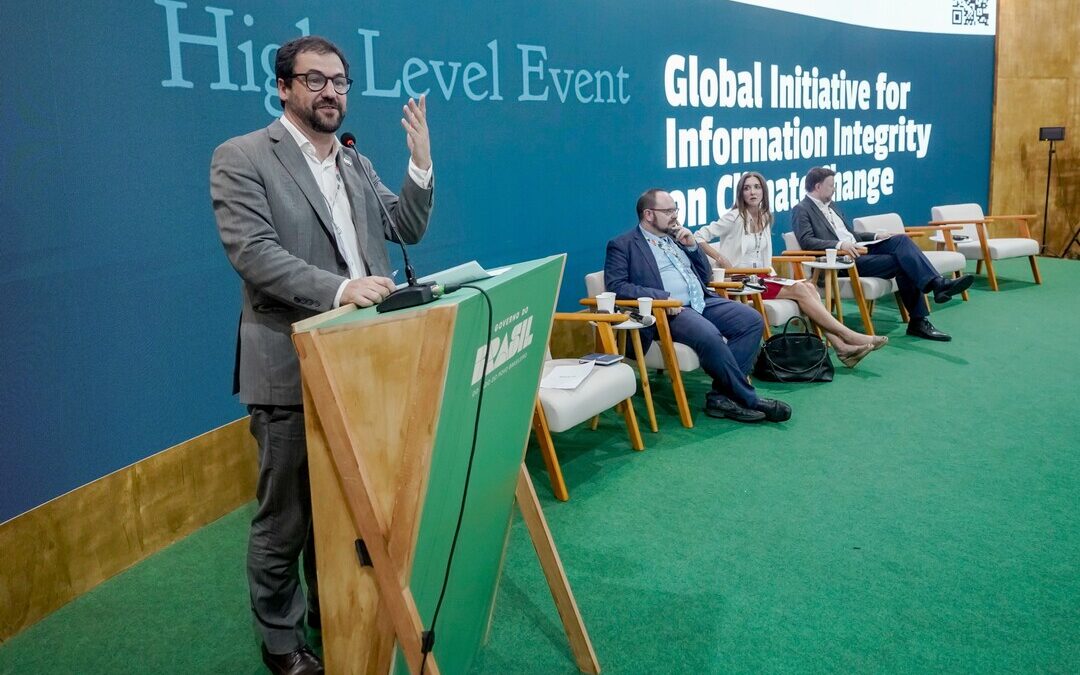COP30 Leaders Advance Global Effort to Fight Climate Change Misinformation
Nations unveil a landmark initiative at COP30 to protect information integrity and combat misinformation shaping climate change.
Governments moved to confront climate misinformation at scale for the first time at a UN climate summit, as the Global Initiative for Information Integrity on Climate Change unveiled a landmark declaration that seeks to embed information accuracy into global climate action.
The Declaration on Information Integrity on Climate Change, launched Wednesday at COP30, commits countries to support credible climate reporting, counter denialism and disinformation and strengthen protection for scientists, environmental defenders and journalists.
Twelve countries have endorsed the document, which marks the first time information integrity has entered the COP Action Agenda.
Leaders Warn of Threats to Science
Brazilian President Luiz Inácio Lula da Silva opened the initiative’s high-level session with a sharp rebuke of climate denialism.
He said disinformation networks have tried to erode scientific consensus and trust in democratic institutions. Lula argued that climate action cannot advance while misinformation spreads unchecked.
“These obscurantists reject scientific evidence and the progress of multilateralism. They sow hatred and fear. It is time to defeat denialists,” Lula said.
COP30 CEO Ana Toni echoed his warning. She said that information integrity underpins every climate decision and argued that a global response is overdue. “This is the COP of Truth,” she said. “We must protect the integrity of information to protect climate action.”
A First for the COP Process
João Brant, Brazil’s secretary for Digital Policies, said the declaration represents a milestone for governments, civil society and research groups that have pushed to address climate misinformation inside the UN climate system. He noted that the issue had never appeared in a COP workstream until now.
The declaration draws from commitments in Article 6 of the UN Framework Convention on Climate Change and Article 12 of the Paris Agreement. It seeks to advance public access to accurate climate information, raise awareness, spur participation and build trust in policies that aim to keep global heating within the Paris temperature threshold.
According to Charlotte Scaddan, senior adviser on Information Integrity at the United Nations, COP30 offered an unprecedented opening to put the topic on the global agenda. She said information has never been more visible at a climate summit, and the new commitments may help shape future climate negotiations.
What the Declaration Demands
The 10-page document calls on governments, media, civil society, researchers and the private sector to act against misinformation, false content and targeted harassment of climate experts.
It states that attacks on scientists and environmental journalists weaken public debate, stall urgent action and threaten global stability.
Drawing on the UN Global Principles for Information Integrity and the Global Digital Compact, the declaration outlines specific actions for signatories.
They pledge to promote information integrity at all governance levels in line with human rights law, including standards on freedom of expression.
They also commit to supporting diverse and resilient media ecosystems and enhancing transparency in climate-related public data.
Crucially, the text urges governments to safeguard journalists and researchers, strengthen transparency on digital platforms, finance research on information integrity and expand climate literacy.
It also calls for the inclusion of information integrity goals in the UN’s Action for Climate Empowerment agenda.
Countries further commit to promoting equitable access to clear, evidence-based information for communities affected by climate impacts. This step, signatories say, will help mobilize society with the urgency required for climate action.
The private sector is urged to ensure advertising practices meet human rights standards and do not amplify misleading climate claims.
Companies are also encouraged to assess whether their platform designs contribute to misinformation and to provide researchers with access to relevant data.
Global Fund Begins Support for Projects
While negotiators discussed the declaration in Belém, the Global Fund for Information Integrity on Climate Change reported that it had begun support for its first round of projects since its launch in June.
Backed initially by $1 million from Brazil, the fund has received 447 proposals from nearly 100 countries. Almost two-thirds of eligible submissions come from the Global South.
The fund supports initiatives that enhance the accuracy of climate information, counter false content and empower local actors to improve transparency. Donors are encouraged to add resources to expand the reach of approved projects.
Next Steps for the Initiative
Signatories stressed that confronting misinformation is essential to meeting climate targets. Delegates said that global decarbonization efforts cannot succeed without public trust, accessible science and reliable coverage of climate impacts.
The declaration remains open to additional endorsements. After COP30, non-members of the initiative may sign and join future workstreams.
As the final text notes, signatories reaffirm that all societies must be equipped with knowledge to act decisively in the face of escalating climate risks.
COP30 Leaders Advance Global Effort to Fight Climate Change Misinformation
Nirmal Menon
Related posts

Subscribe
Error: Contact form not found.


